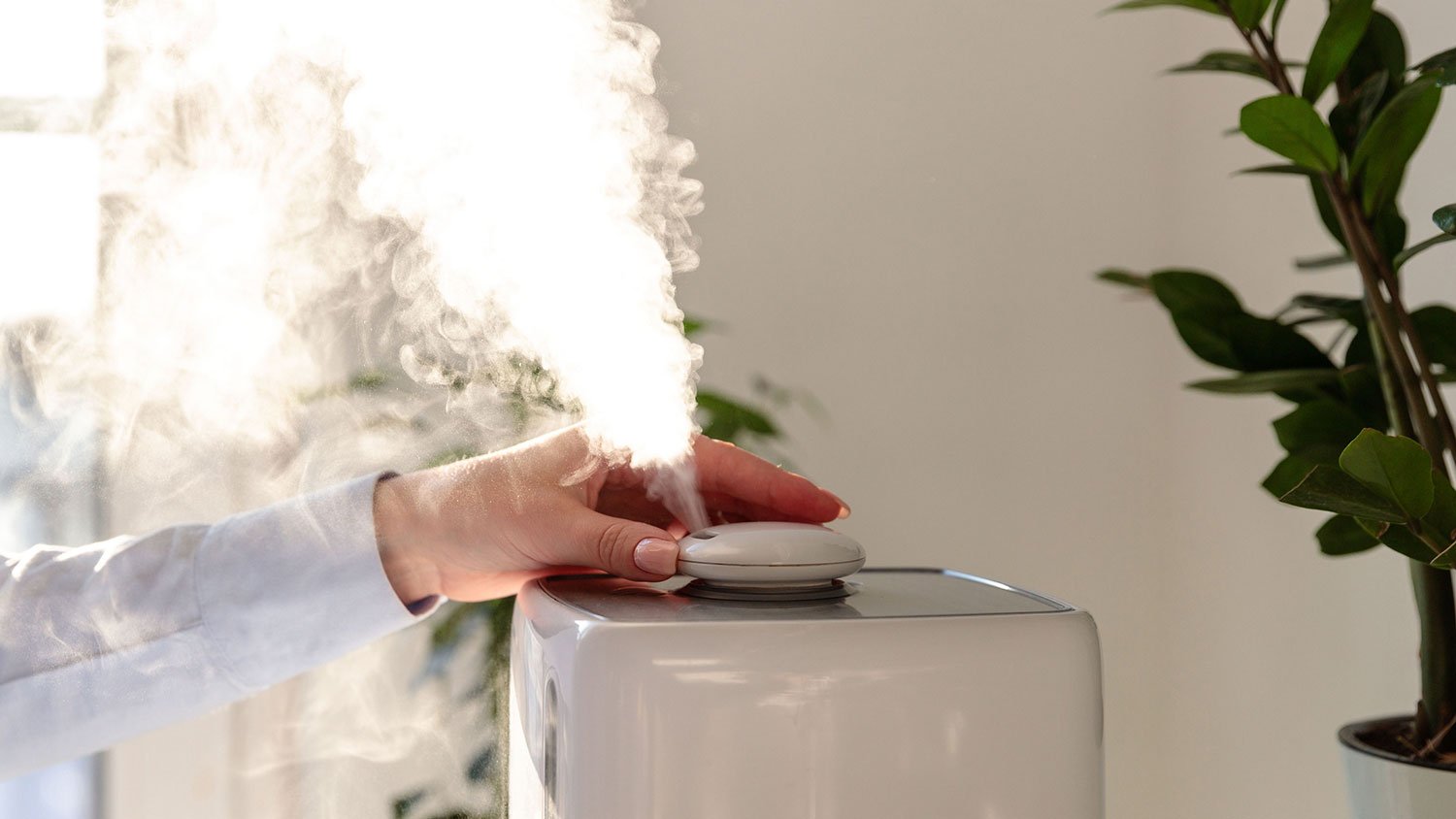What Are the Benefits of a Humidifier for Your Home?
While humidity might wreak havoc on your hairdo, a home humidifier can benefit your health


You can check the humidity in your home with a monitor that runs from $20 to $60.
Increasing the humidity in your home has many health benefits.
There are several different types of humidifiers, including desktop, console, and whole home.
If you live in a drier climate—or somewhere that gets cold in the winter—you know that moisturization is an essential part of life. Dry air can irritate your skin and sinuses, leave your clothes staticky, and even damage your home. The answer to your dry air problems may be a home humidifier—here are the benefits and how to choose the right one for you.
How to Know if You Need a Humidifier
Are you getting shocked every time you touch a doorknob? Does your hair stand up after you brush it from all the static in the air? Do your sinuses feel dry, and at the same time, your nose runs constantly? If you’re experiencing these problems, bringing in a humidifier is a good idea.
If you’re looking for a more precise answer, checking your home’s humidity with a humidity monitor will give you exact measurements of your home’s humidity and temperature levels. You can pick one of these up at your local home improvement store for between $20 to $60. If the humidity level in your home is lower than 30%, you should consider purchasing a humidifier for your home.
Benefits of Humidifiers
Humidifiers come with a whole host of benefits for your health, your skin, and your home.
Health Benefits
Moist sinuses are happy sinuses, and a humidifier can help with that in dry climates. When your air is too dry, your sinus membranes get irritated, leading to sore throats, pain in your nose, and an unhealthy respiratory system. If you catch a cold or the flu, your sinuses get irritated by the viruses, and having dry air compounds the discomfort. The same is true for allergy sufferers—allergies irritate your mucous membranes, and if these membranes are dry, it’s even more uncomfortable to deal with allergy symptoms.
Healthier Sleep
Humidifiers also help with sleep quality. When your sinuses are dry, you’re more prone to snoring, which can not only affect the quality of your sleep, it can also bother your other family members. A humidifier will also keep your throat moistened, making you less likely to cough during the night and/or wake up with a sore throat.
Better Skin
Most everyone deals with itchy, dry skin in the winter. Humidifiers help your skin retain its natural oils and moisture, which means less dry skin to worry about. Moisturized skin means fewer wrinkles and less body lotion needed—it’s a win all around. And though it may seem counterintuitive, dry air actually causes your skin to overproduce oil, which leads to acne.
Utility Savings
Moist air tends to feel warmer, meaning if you have a humidifier, you can keep your thermostat set a degree or two lower than you would otherwise. Setting your thermostat one or two degrees lower can have an impact on your utility bills over time.
Which Type of Humidifier Should You Buy?
When looking at different types of humidifiers, you’ve got a good range of choices, from small desktop models to whole-home humidifiers.
Desktop Humidifiers

A desktop humidifier is a cost-effective option to add moisture to your bedroom or home office space. These models have several benefits, including being compact and easy to move if you want to move it from your bedroom to your home office during the day. The larger the tank, the longer the humidifier run-time, and some models can run up to 48 hours before requiring a refill.
Some desktop models also come with other options like an essential oil tray, multiple speeds, germ reduction, and hot and cool mist outputs. Since there’s a large variety of options to choose from, tabletop humidifiers have a broad price range from $15 to around $200.
Console Humidifiers
A step up in size from desktop models, console humidifiers are designed for larger spaces, with some models covering up to 3,000 square feet. These humidifiers work best in a central location in your home so they can distribute a mist throughout the home. Console humidifiers run from $150 to upwards of $1,000, depending on the amount of space they cover and their options.
Whole-Home Humidifiers
If you live in an arid climate or your entire home has a significant lack of humidity, you may want to consider a whole-home or ducted humidifier. Whole-house humidifiers work with your HVAC system and tap into your water supply, so they don’t require refilling, and they disperse moisture throughout your home. The cost of a whole-home humidifier runs between $100 and $300, though some cost upwards of $1,000.
Other Options to Humidify Your Home
If you’re not ready to buy a humidifier just yet, there are some DIY ways to naturally humidify indoor air. Air drying your laundry releases moisture into the air, as does leaving your bathroom door open while showering. Certain plants, like spider, jade, and rubber plants, increase your home's air humidity. And making sure your doors and windows are properly sealed, aside from the energy-efficiency perks, will help stop moist air in your home from escaping.





- Furnace Repair
- Air Conditioning Repair
- HVAC Repairs
- Furnace Installation
- Wood & Pellet Stove Repair
- Dehumidifier & Humidifier Repair
- Heat Pump Companies
- Swamp Cooler Repair
- Wood Stove Services
- HVAC Companies
- Commercial A/C Repair
- Geothermal Installation
- Air Conditioning Installation
- Boiler Repair
- 24 Hour Furnace Repair
- Geothermal Repair
- Heat Pump Repair
- Humidifier Installation
- Thermostat Repair
- Thermostat Installation
- Nest Installation
- Heating & Cooling
- Heating Repair
- Furnace Cleaning
- Furnace Tune-Up
- HVAC Technicians
- Subcontractors
- Furnace Maintenance
- Plumbing & Heating Companies
- Wood Stove Inspection
- Mini Split Installation
- Wall Heater Repair
- Duct Installers
- 4 Types of Whole-House Humidifiers That Will Benefit You Most
- Whole-House Humidifier Pros and Cons: Are Humidifiers Worth It?
- How to Clean a Humidifier (And Maintain It Too)
- Humidifier vs. Purifier: What’s the Difference?
- Who Installs Whole-House Humidifiers?
- The Ideal Indoor Humidity Level for Your Home
- How to Humidify a Room Without a Humidifier
- How to Measure Humidity in Your Home With and Without a Hygrometer
- 10 Tips for Better Electric Furnace Maintenance
- Breathe Easy: 10 Tips for Improving Your Indoor Air Quality















